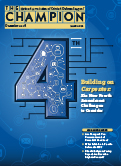December 2018

What are some of the current investigative techniques – including Enhanced 911 tracking and the collection of data from “smart” devices – that may be ripe for constitutional challenges after the Carpenter decision?
Articles in this Issue
-
Affiliate News
Affiliate News from The Champion December 2018
-
Are Younger’s Ten Commandments of Cross Still Good Law in Today’s Courtroom?
Prior to Professor Irving Younger’s lecture on the Ten Commandments of Cross-Examination, no organized effort had been made to outline how an attorney should form and ask cross-examination questions designed to attack credibility. In Younger’s estimation, 25 jury trials are required for attorneys to gain their “sea legs” and become good cross-examiners. Bill James assesses Younger’s Ten Commandments to determine if they have withstood the test of time.
-
Building on Carpenter: Six New Fourth Amendment Challenges Every Defense Lawyer Should Consider
Carpenter v. United States requires law enforcement to obtain a warrant to access historical cell site location information from cellphone service providers. Lower courts have started to apply the lessons of Carpenter to other forms of modern surveillance. Michael Price and Bill Wolf offer a brief appraisal of some current investigative techniques — including Enhanced 911 tracking and the collection of data from “smart” devices — that may be ripe for constitutional challenges in a post-Carpenter world.
-
From the President: When Your Art Can and Will Be Used Against You
Hip-Hop, Expression, and the Criminal Justice System
Prosecutors sometimes use hip-hop lyrics and imagery as factual evidence in cases. Defense lawyers should actively discourage attempts by prosecutors to unfairly weaponize this art form.
-
Informal Opinion: Indigent Persons Facing Deportation Should Have the Right to Appointed Counsel
Even for a misdemeanor, an indigent person who is facing any jail time is entitled to appointed counsel. Because deportation is considered to be “civil” rather than “criminal,” however, an indigent person facing deportation is not entitled to appointed counsel. “It does not make sense,” Tova Indritz says, but she offers “a spot of good news.”
-
Inside NACDL: A New Era at NACDL: Bylaw Changes to Support the Criminal Defense Profession and Promo
When NACDL adopted a new strategic plan in 2018, it led to bylaw changes that reflect a new era for the national criminal defense bar.
-
Practicing Before the International Criminal Court
The International Criminal Court (ICC) began operating in 2002 in The Hague, a Dutch city 40 miles southwest of Amsterdam. Although the United States is not an ICC member, a few Americans serve as defense lawyers and prosecutors there. The ICC has jurisdiction to prosecute war crimes, crimes against humanity, genocide, and waging aggressive war. Peter Robinson, a defense lawyer at the ICC, explains how the ICC works and describes the challenges involved in advocating on a world stage.
-
State Criminal Justice Network - Legislative Update
During the 2018 legislative session, NACDL tracked over 28 criminal justice issues ranging from asset forfeiture reform to surveillance reform.
